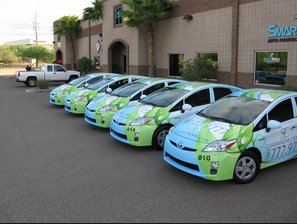 So why would a company like Elio Motors with its three-wheel electric car choose fleets as its primary market instead of consumers? The company is moving through red tape for its $185 million loan through the US Dept. of Energy’s Advanced Technology Vehicle Manufacturing program. While it may sound strange that a specialty electric vehicle maker would choose the fleet market, there are reasons for it. According to a post on the Elio Motors Blog: “We have talked about ‘why Elio’ quite a bit, but to the fleet customer the economics are many times larger than for an individual. Think about it, you can save $1,500 a year on fuel which is enough to make a LOT of payments. Now multiply that times 100, or 200 or as much as 1000! That is real (huge) savings for companies. Each gallon of fuel saved is money in their pocket and helps save our environment.”
So why would a company like Elio Motors with its three-wheel electric car choose fleets as its primary market instead of consumers? The company is moving through red tape for its $185 million loan through the US Dept. of Energy’s Advanced Technology Vehicle Manufacturing program. While it may sound strange that a specialty electric vehicle maker would choose the fleet market, there are reasons for it. According to a post on the Elio Motors Blog: “We have talked about ‘why Elio’ quite a bit, but to the fleet customer the economics are many times larger than for an individual. Think about it, you can save $1,500 a year on fuel which is enough to make a LOT of payments. Now multiply that times 100, or 200 or as much as 1000! That is real (huge) savings for companies. Each gallon of fuel saved is money in their pocket and helps save our environment.”
That sounds very familiar to conversations I’ve had in the past couple of years with fleet managers. There sometimes are concerns and mandates to reduce emissions and fuel consumption, but in the end, containing costs is the top priority given to fleets in corporate, government, and other sectors. For the clean transportation industry, fleets are the focal point of direct marketing. Tesla Motors is benefiting from upper income, educated individuals signing on for lease payments on the Model S, but as for the rest of the green vehicles and infrastructure, fleets make up most of the marketplace. Besides buying in volume, they bring institutional credibility to the new technology. If a municipal fleet brings in 150 compressed natural gas trash trucks; or a delivery fleet reduces its fuel consumption and emissions 20% in one year by switching over to hybrids, that truly stands out with media, stakeholders, and the general public.
Here are a few newsworthy items on what fleet managers are thinking about clean transportation……
- Debunking myths emanating from common alternative fuel vehicle misconceptions was the focus of a speaker panel at Green Fleet Conference in Schaumburg, Ill., last week. Richard Battersby, manager of Equipment Services for the City of Oakland, Calif., and coordinator of the East Bay Clean Cities Coalition, chaired the panel. Battersby thinks there is a “dizzying choice” available today in fuels: CNG, LNG, renewable natural gas, dimethyl ether (DME), E85, hydrogen, battery electric, plug-in electric, biodiesel, renewable diesel, algae diesel, clean diesel; and there will be more. Read on for interesting quotes on electrified transportation, diesel, biodiesel, propane, and natural gas.
- The city of Indianapolis signed up for Vision Fleet’s Clean Miles Solution, a total-cost-of-ownership plan for bringing electric vehicles (EVs) into its fleet. It bundles the process together and guarantees all the expenses of purchasing, operating, and fueling an EV. Indianapolis will utilize Clean Miles Solution to deploy 425 EVs in its non-police fleet by early 2016. That will be the largest ever EV deployment by a public fleet in the US. It comes out of an executive order made by Mayor Gregory Ballard in 2012 that pledges the city’s fleet will reach post-oil technology by 2025.
- PepsiCo has removed 55,000 metric tons of carbon dioxide from the atmosphere through reducing fuel consumption in its fleet by 24% since 2010. That will continue further for its trucks and passenger vehicles, according to Green Century Capital Management, which is working with Pepsi on its climate change efforts. Pepsi’s plan includes implementing a formal request for proposal process seeking low carbon fuel alternatives from its suppliers.
- Downsizing the fleet and looking for transportation alternatives has become a viable option for a few municipal fleets in large US cities. Their goals can be met several ways to reduce carbon emissions and fuel consumption. Reducing the number of vehicles in their fleet, based on their utilization rates, has been at the heart of it. Bringing in outside vendors such as Zipcar for its carsharing services is also taking care of short-term transportation needs. Fleet managers will see several of the vehicles in the fleet idling in parking lots for the majority of time. Downsizing the fleet and accessing alternative transportation is reducing costs and bringing accolades to fleet staff.
